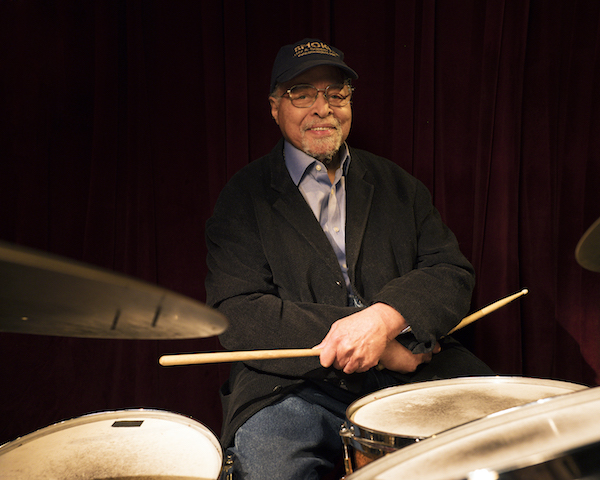Jan 13, 2026 2:09 PM
More Trump-Kennedy Center Cancellations
The fallout from the renaming of the John F. Kennedy Center for the Performing Arts to include President Donald…

Jimmy Cobb (1929–2020)
(Photo: Jimmy Katz)Drummer Jimmy Cobb—famous for a discography that includes appearances on numerous Miles Davis albums, including 1959’s Kind Of Blue—died in his Manhattan home May 25 from lung cancer, according to WBGO. He was 91.
Cobb was a member of Davis’ band between 1957 and 1963, and appeared on several of the trumpeter’s albums, including, among others, Porgy And Bess (1959), Sketches Of Spain (1960), Miles Davis In Person: Friday Night At The Blackhawk (1961) and Miles Davis At Carnegie Hall (1962).
Following his stint with Davis, Cobb worked in pianist Wynton Kelly’s namesake trio with bassist Paul Chambers. (Kelly and Chambers had been in Davis’ band, too.)
A tasteful drummer known for his pulse and groove—who eschewed showy grandstanding—Cobb was comfortable being in the role of accompanist. It was a quality that made him a sought-after collaborator for decades.
During a career that began in the late 1940s, Cobb performed with the biggest names of the genre. A partial list of collaborators illustrates a wide span of musical history: Billie Holiday, Charlie Parker, Dizzy Gillespie, John Coltrane, Clark Terry, Sarah Vaughan, Cannonball Adderley, Wes Montgomery, Dinah Washington, Ron Carter, Nancy Wilson, Wayne Shorter, Brad Mehldau, Roy Hargrove and Christian McBride.
A native of Washington, D.C., James Wilbur Cobb was born Jan. 20, 1929. When he began playing drums as youngster, his key influences included Max Roach and Kenny Clarke.
Cobb’s leader projects included Only For The Pure Of Heart (1998), Cobb’s Corner (2007) and The Original Mob (2014). In 2019, Smoke Sessions released his album This I Dig Of You, recorded with guitarist Peter Bernstein, pianist Harold Mabern and bassist John Webber.
In an article by Ted Panken in the September 2019 issue of DownBeat, Cobb described how he devised the insistent ride-cymbal sound for which he became famous.
“I developed it from not having something else,” he said. “Once, on a gig with Dizzy Gillespie, I was playing a coordination thing out of Jim Chapin’s book with figures he’d heard guys play without the bass drum being in 4, as guys had done in the big bands, so that everyone could hear the beat. Dizzy probably was used to hearing his guys play that way, and he came over and put his ear down by the bass drum. I told him, ‘Well, Birks, I don’t have a big 4/4 like that.’ I had to have the beat somewhere, so I concentrated on making it heard on the cymbal. I always liked the way Kenny Clarke played the cymbal—nice and quiet, but definite and killing—and I got some stuff from him.”
As a clinician, Cobb taught at numerous institutions, including the Stanford Jazz Workshop, The New School for Jazz and Contemporary Music, the University of Greensboro in North Carolina and the International Center for the Arts at San Francisco State University.
When Cobb was named a 2009 NEA Jazz Master fellowship recipient, he issued this statement: “I am humbled to be included among the great musicians in our American history. I express my gratitude to these jazz giants, many of whom were close friends, who shaped this great American art form called jazz and ultimately helped to shape my life as well. I thank the NEA committee for recognizing America’s jazz masters and the art of jazz itself and I am honored and privileged to be a part of this legacy.”
Survivors include his wife and two daughters. DB

Belá Fleck during an interview with Fredrika Whitfield on CNN.
Jan 13, 2026 2:09 PM
The fallout from the renaming of the John F. Kennedy Center for the Performing Arts to include President Donald…

Peplowski first came to prominence in legacy swing bands, including the final iteration of the Benny Goodman Orchestra, before beginning a solo career in the late 1980s.
Feb 3, 2026 12:10 AM
Ken Peplowski, a clarinetist and tenor saxophonist who straddled the worlds of traditional and modern jazz, died Feb. 2…

The success of Oregon’s first album, 1971’s Music Of Another Present Era, allowed Towner to establish a solo career.
Jan 19, 2026 5:02 PM
Ralph Towner, a guitarist and composer who blended multiple genres, including jazz — and throughout them all remained…

Rico’s Anti-Microbial Instrument Swab
Jan 19, 2026 2:48 PM
With this year’s NAMM Show right around the corner, we can look forward to plenty of new and innovative instruments…

Richie Beirach was particularly renowned for his approach to chromatic harmony, which he used to improvise reharmonizations of originals and standards.
Jan 27, 2026 11:19 AM
Richie Beirach, a pianist and composer who channeled a knowledge of modern classical music into his jazz practice,…